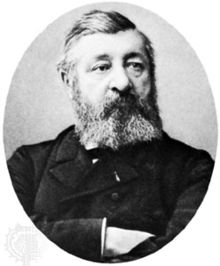Léon Gautier (historian)
You can help expand this article with text translated from the corresponding article in French. (January 2011) Click [show] for important translation instructions.
|

Émile Théodore Léon Gautier (8 August 1832 – 25 August 1897) was a French literary historian.
He was born at Le Havre, France. He was educated at the École des Chartes, and became successively head of the archives of the département of Haute-Marne (1856) and archivist at the Imperial Archives in Paris (1859). In 1874 he became a professor of palaeography at the École des Chartes. He was elected a member of the Academy of Inscriptions in 1887, and became chief of the historical section of the National Archives in 1893.[1][2]
Gautier rendered great services to the study of early French literature, the most important of his numerous works on medieval subjects being a critical text (Tours, 1872) with translation and introduction of the Chanson de Roland,[3] and Les Épopées françaises (3 volumes, 1866–1867; 2nd edition, 5 volumes, 1878–1897, including a Bibliographie des chansons de geste).[1]
Works
[edit]- Œuvres poétiques d'Adam de Saint-Victor (1858/59) – Poetic works of Adam de Saint-Victor.
- Les Épopées françaises (1865/68) – The French epics.
- La Chanson de Roland (critical edition, 1872)
- Portraits contemporains et questions actuelles (1873)
- La Chevalerie (1884) – On chivalry.
- Histoire de la poésie liturgique au Moyen Âge: les tropes (1886) – History on liturgical poetry of the Middle Ages.
- Portraits du XIXe siècle I. Poètes et romanciers, (1894/95)
- Portraits du XIXe siècle. Historiens et critiques, (1894/95)
- Portraits du XIXe siècle. Nos adversaires et nos amis, (1894/95)
- Bibliographie des chansons de geste (1897).[4]
- La France sous Philippe-Auguste (1899)
References
[edit]- ^ a b Chisholm 1911.
- ^ Emile-Théodore-Léon Gautier (1832–1897) Chiré (biography in French)
- ^ La chanson de Roland HathiTrust Digital Library
- ^ HathiTrust Digital Library Published works by Léon Gautier
- This article incorporates text from a publication now in the public domain: Chisholm, Hugh, ed. (1911). "Gautier, Émile Théodore Léon". Encyclopædia Britannica. Vol. 11 (11th ed.). Cambridge University Press. p. 536.


 French
French Deutsch
Deutsch